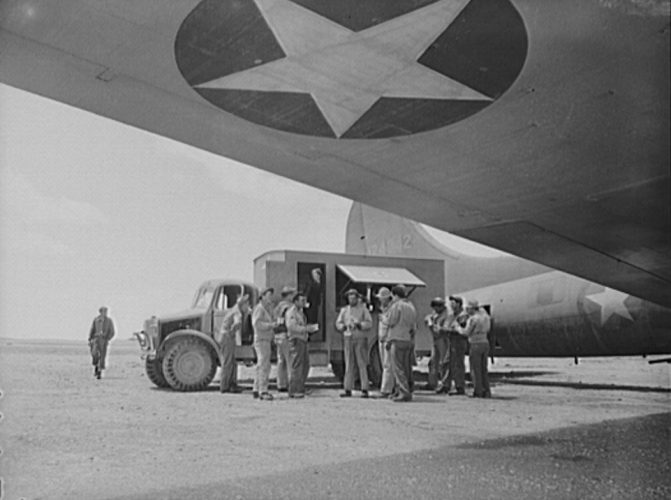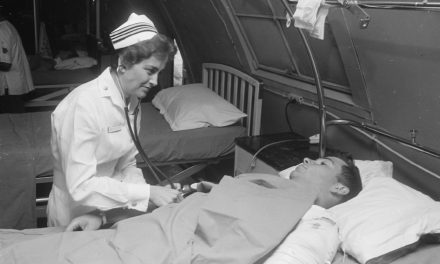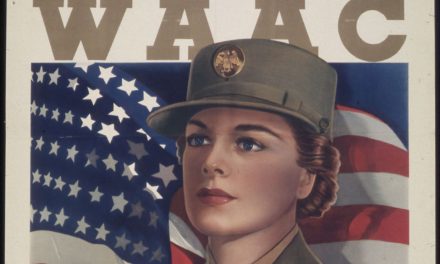Bum da da dum tssss. Bum da da dum tssss. Bum da da dum tssss.
The coffee bubbles against hot metal as the heat from the stovetop flame intensifies on the percolator. Twenty-three-year-old Erna Torney rushes to grab an oven mitt and pull the coffee-maker from the flame, carefully pouring the steaming hot contents into the waiting mugs of the army officers.
She asks the men if they want anything to eat with their coffee and makes her way back to the stovetop to boil more coffee after taking their orders.
Torney is a lady of the American Red Cross Clubmobile Service, which pitches large tents on army bases and provides the soldiers with food, water and entertainment. She, along with her fellow Clubmobile women, serves up coffee, donuts and other pastries to the hard-working men of the U.S. military. That isn’t their only responsibility, however.
“It’s our mission to cheer things up,” Torney says.
Torney was born in New York City to two Viennese immigrants and decided apply to be a “Red Cross girl” (as she and others call themselves) after her friend Charlotte joined. Once she was accepted, Torney traveled to Washington, D.C. and trained with women from all around the country. Torney learned basic skills like how to change a tire or a sparkplug, then she was transferred to a base far from her native upstate New York, where she had been teaching before joining the service.
The B-24 Air Force Base in Flixton, England became Torney’s new home.
Torney is an artistic woman – she plays the piano and appreciates the delicate side of life, so to her the B-24 fighter planes are giant, rough machines. But she has no hesitation about climbing into one.
“We’re flying up to Edinburgh, you want to come?” one of the airmen recently asked Torney and the other Clubmobile women.
Torney replied, “Sure, I want to come!”
So Torney hopped into the plane and soared off on an adventure.
Being a Red Cross girl isn’t all fun and games, however. Torney and the other ladies are there for work and are responsible for keeping up the kitchens, which are always busy.
“When you’re on a B-24 base, they’re doing air raids,” Torney says of the troops. “They wake up really early in the morning, get the planes heated up and take off. And we are always there when they came back from their flights. We never know who is coming back or how they are coming back. It’s very, very tense. But we always are there with sandwiches and coffee.”
Breaking the tension is Torney’s true job. She and the other Clubwomen keep the servicemen happy and lighten the mood, making the base a more pleasant place than it would be without them.

A Red Cross Clubmobile serving donuts and coffee to a crew that just returned from a dangerous mission. From Wikimedia Commons.
“They have to fly 30 missions, and after 30 missions they are coming back,” Torney says. “Their 30th mission we always have a pie for them – and a British pie is way different than our kind of pie; it’s a big piece of pastry with jam on it. But every one of them gets one of those pies and they are looking forward to it.”
Torney supposes that they are just happy to have made it back at all.
“They show me the pieces of flak that were shot into the planes – it’s not a great, happy experience flying over and dropping bombs,” she said.
Food isn’t the only way that the Clubwomen boost spirits, though. On the base there are several large Quonset huts filled with tables, pianos and other activities for the men. The servicemen play cards and read library books and the ladies get them whatever they need.
“We post ads around the local villages saying that we are sending trucks through at a certain time and that’s very successful, of course, the local British girls come in dancing,” Torney says. “And some of the GIs from different bases have little orchestras. They come and play for the music. And that’s when I do some singing too.”
It’s Torney’s job to brighten the mood of the servicemen, but she never thought when joining the American Red Cross that one of them would be there to brighten her mood for the rest of her life.
When Torney was to be transferred to a different base, one of the pilots at Flixton, Jack Torney, couldn’t entertain the idea of her leaving.
When Erna told Jack that she was being transferred, his reply was swift.
“You can’t do that,” he said.
Erna chuckled and responded, “Well, that’s my job.”
“Then let’s get married,” said Jack.
Erna’s reply was a simple, “Well, alright.” The entire ordeal was quick, yet romantic.
“We went to London and we picked out this beautiful engagement ring and decided to get married right there in the church that was on the base,” Erna says.
Torney’s experiences on the base have been mainly happy ones. Yes, there are tense moments where the reality of war and death settles in, but it’s her job to make everyone forget about that reality, even if just for a little while.
Torney says that she hopes Red Cross women aren’t solely thought of as nurses, because she feels that the Clubmobile ladies deserve recognition as well.
“Our clubs are very important and help them through a very tough time.”
Author’s Note: The quotations from Torney were changed from past to present tense.
Source:
Marin History Museum, “A Red Cross Girl: Erna Torney’s Story.” Interview by Sierra Chin. Available at https://www.youtube.com/watch?v=uk1VKwDXIS4, accessed December 19, 2016.




